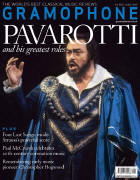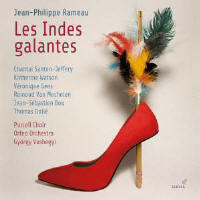Texte paru dans: / Appeared in: |
|
|
Outil de traduction (Très approximatif) |
|
|
Reviewer: Richard Lawrence The first thing to say is that this is quite excellent, well up to the standard of the two previous Rameau productions by the same artists: Les fêtes de Polymnie (4/15) and Naïs (8/18). If you enjoyed those recordings, stop reading and place your order now. But there are some textual matters to clear up. The performance is based on the new critical edition by Sylvie Bouissou, who contributes one of the booklet articles. Variously described as an opéra-ballet and a ballet héroïque, The Amorous Indies was first performed at the Paris Opéra in August 1735. It thus came between Hippolyte et Aricie (1733) and Castor et Pollux (1737). As so often with Rameau, there were revisions and more revisions. By the following year it had been enlarged to consist of a Prologue and four entrées. The version chosen for this recording is stated to be the last, from July 1761, by when Rameau had composed all his operas apart from Les Boréades. Thus there are only three entrées – the one dropped here is ‘Les fleurs’ – and there are alternative versions to some of the numbers in ‘Les Incas du Pérou’ and ‘Le Turc généreux’. Not all of them are given here, however: for instance, the earthquake-cumvolcano in ‘Les Incas’ is heard in the extended, harmonically adventurous version of the premiere. The part of Amour – Cupid – had been dropped after that first performance; as compensation, there’s an extra air for Bellone, ‘C’est la gloire’. That this performance is not, strictly speaking, of the 1761 version does not of course detract from one’s enjoyment. György Vashegyi gets wonderful singing and playing from his Hungarian forces, the Purcell Choir and (led by Simon Standage) the Orfeo Orchestra. The earthquake is vivid in the extreme, and so is the tempest in ‘Le Turc généreux’. The many dances are played with grace and the final Chaconne, with its bassoons and low oboes, is a delight. The woodwind are especially appealing when combined with the musettes. The singers, some of whom have appeared with Vashegyi before, are all one could desire. Chantal Santon-Jeffery, who carols sweetly as Hébé in the prologue, is dazzling in Zima’s ‘Régnez plaisirs et jeux’ at the end of ‘Les Sauvages’. In ‘Le Turc’, Katherine Watson is spine-tingling at the start of the tempest and touching when she is reunited with the Valère of Reinoud Van Mechelen, whose air ‘Sur ces bords une âme enflamée’ is a tiny, lyrical highlight in a scene mostly conducted in recitative. Van Mechelen is the lover in ‘Les Incas’, too, where he is partnered by Véronique Gens: forthright in dialogue with Dom Carlos and Huascar, she is gentle in her prayer to Hymen. As Huascar – a victim of unrequited love rather than a true villain – Thomas Dolié submits magnificently to being crushed to death when the volcano erupts for a second time. In the last entrée, ‘Les Sauvages’, the baritone Jean-Sébastien Bou does well in the tenor role of Adario, the noble savage preferred by Zima; as Osman, he brings real dignity to the rather perfunctory scene where the Turk shows his generosity. Apart from some overenthusiastic timpani rolls, the whole thing – performance and recording – is beautifully done. |
|




